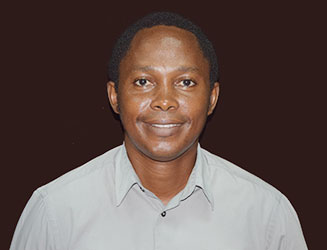Staff Profile

BIO
Kwame S. Ibwe is a Senior Lecturer, academic and researcher at the Department of Electronics and Telecommunications Engineering, College of Information and Communication Technologies (CoICT), University of Dar es Salaam (UDSM), Tanzania. He is a well-established scholar with tracked experience in undertaking advanced research that attracts wide readership. Dr. Ibwe has collaborated with local, regional, and international researchers to conduct groundbreaking research in the areas of signal processing for wireless technologies, smart energy systems, machine learning, digital and analogue electronics, robotics, and embedded systems, OFDM, mmWave, innovation and entrepreneurship, microwave technologies and among other science and engineering fields. He is involved in more than five (5) fundable research projects, either as a principal investigator or team member. He has published over 40 articles in refereed national and international journals and conference proceedings. Dr. Ibwe has also published two policy briefs on the facilitation of integrating renewable energy sources into the main grid. Currently, he is the principal investigator of smart grid projects and smart reproductive health products for youth. He teaches undergraduate, postgraduate, and research students at the University of Dar es Salaam, mentoring the next generation of engineers and researchers.
Dr. Ibwe’s research focuses on enhancing wireless communication technologies and smart grid systems to address modern connectivity and energy challenges. His work explores advanced techniques in signal processing for wireless networks, particularly in optimizing OFDM, mmWave, and microwave technologies for next-generation communication systems. Additionally, his research extends to smart grid innovations, improving the reliability, security, and efficiency of energy distribution through advanced metering infrastructure, IoT, big data analytics, and deep learning. He investigates how machine learning, GIS mapping, and decentralized energy management can enhance energy sustainability, optimize grid performance, and support the integration of renewable energy. Through these efforts, Dr. Ibwe aims to develop robust, intelligent, and adaptive energy and communication infrastructures, contributing to the digital transformation and economic development of Tanzania and beyond.
RESEARCH
Research topics
Signal processing for wireless communication systems
My main research area is on signal processing for Wireless communication systems. In this area I mainly concentrate with wireless systems using orthogonal frequency division multiplexing (OFDM). This technique provides both modulating and multiplexing effects to signals of interest. OFDM was initially developed as a modulation scheme for high-capacity data transmission in wireless communication systems. It divides the available frequency band into multiple orthogonal subcarriers that are closely spaced in the frequency domain. Each subcarrier is modulated using complex-valued symbols, and the resulting modulated subcarriers are transmitted in parallel. OFDM provides excellent spectral efficiency and robustness against multipath fading.
Then followed the introduction of Multi-User OFDM (MU-OFDM), also known as OFDM with Multiple Access (OFDMA). MU-OFDM extended the capabilities of OFDM to support multiple users by allocating different subsets of subcarriers to different users simultaneously. This allowed for concurrent transmission and reception by multiple users in the same frequency band. In OFDMA, a central challenge is the efficient allocation of subcarriers and other system resources among multiple users. Various resource allocation algorithms were developed to optimize the allocation process based on factors such as channel conditions, user requirements, quality of service (QoS) constraints, and system capacity. These algorithms aim to maximize the overall system performance and user satisfaction. OFDMA can support different multiple access schemes to manage the simultaneous transmission of multiple users. These schemes include Frequency Division Multiple Access (FDMA), where different users are assigned separate sets of subcarriers, and Time Division Multiple Access (TDMA), where different users are assigned different time slots for transmission. Hybrid access schemes that combine FDMA and TDMA techniques have also been developed to strike a balance between frequency and time domain resource allocation.
The evolution of OFDMA was primarily driven by standardization efforts for wireless communication systems. OFDMA has been adopted in various cellular standards, including 4G LTE (Long-Term Evolution) and 5G (Fifth Generation), where it serves as the primary multiple access scheme. These standards define the specific parameters, protocols, and interfaces for OFDMA-based systems, enabling interoperability among different vendors and networks.
Through these developmental steps, OFDM evolved into OFDMA, which offers the ability to efficiently allocate frequency resources to multiple users, enhance system capacity, and support high-speed data transmission. OFDMA has become a key technology in modern cellular networks, facilitating improved spectral efficiency, increased user capacity, and better utilization of the available spectrum.
Despite the mentioned benefits, OFDMA comes with some challenges. OFDMA is a complex modulation scheme that requires sophisticated signal processing algorithms and hardware implementation. In OFDMA, multiple users share the same frequency resources, and interference between users can occur. Interference from adjacent subcarriers or neighboring cells can degrade the performance of individual users and reduce the overall system capacity. Wireless channels are subject to variations due to factors like fading, multipath propagation, and mobility. OFDMA systems need to cope with these channel variations and adapt the allocation of subcarriers to maintain good system performance. Dynamic channel estimation, fast feedback mechanisms, and efficient resource allocation algorithms are required to handle the time-varying nature of the wireless channels. OFDMA signals can exhibit high peak-to-average power ratios, meaning the signal can have large power peaks compared to its average power. This can result in power inefficiency and potential distortion in the transmission. OFDMA systems require tight synchronization among multiple users to ensure orthogonality among the subcarriers. Accurate timing and frequency synchronization are essential to maintain the orthogonality and minimize interference between users. When deploying OFDMA in existing networks, backward compatibility with legacy systems may be a challenge. OFDMA-based systems need to coexist and interoperate with older technologies, which may have different access schemes and modulation techniques. Addressing these challenges requires advanced signal processing techniques, efficient algorithms, and careful system design. Post graduate students can be engaged to address these challenges and come up with feasible solutions.
In view of the mentioned challenges, I have summarized some research questions which students can use to form their research titles:
- How can interference be effectively mitigated in OFDMA systems?
- What advanced interference cancellation, interference avoidance, and resource scheduling techniques can be developed to improve the system capacity and mitigate interference between users?
- How can channel variations and dynamics be efficiently handled in OFDMA systems?
- What techniques can be devised for dynamic channel estimation, fast feedback, and adaptive resource allocation to ensure optimal system performance under varying channel conditions?
- How can the computational complexity of OFDMA systems be reduced without compromising performance?
- Are there novel algorithms or hardware architectures that can simplify the processing requirements while maintaining the benefits of OFDMA?
- What methods can be employed to address the high peak-to-average power ratio (PAPR) issue in OFDMA signals?
- How can power amplification and signal processing techniques be optimized to improve power efficiency while managing PAPR?
- What novel synchronization techniques can be developed to achieve and maintain accurate timing and frequency synchronization in OFDMA systems?
- How can synchronization challenges be addressed in large-scale and dynamic deployments?
- How can OFDMA systems seamlessly coexist and interoperate with legacy technologies?
- What mechanisms can be devised to ensure efficient resource sharing and backward compatibility between OFDMA and non-OFDMA systems?
- How can resource allocation algorithms be optimized to improve the overall system capacity, fairness, and quality of service in OFDMA networks?
- What novel approaches can be developed for efficient allocation of subcarriers and power resources?
- How can cross-layer optimization techniques be employed to enhance the performance of OFDMA systems?
- How can the interaction between physical layer, MAC layer, and higher-layer protocols be optimized to achieve better overall system efficiency and user experience?

